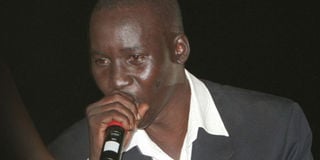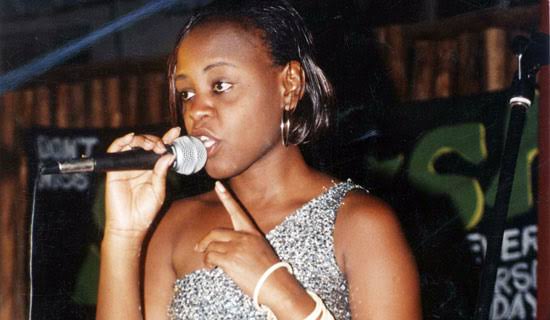Prime
Fred Maiso: an eagle flown past too soon

Maiso during an Eagle’s Poduction performance. FILE PHOTO
What you need to know:
It is for the music that Maiso will and should be remembered, not the tragicomedy that became of his last few months.
Superstitious conspiracy theorists would say things with the number three in them were not very kind to Fred Maiso, both in life and death. At 3:00pm on February 13, he was announced dead at Mirembe Health Centre in Najjanankumbi.
It was three dates before he was buried at Petete in Pallisa, a month after officially complaining, on January 13, to the Uganda Medical and Dental Practitioners Council about Dr Haruna Kityo of Mac Clinic on Bombo Road, citing medical negligence when the dentist extracted three teeth of his at once.
By press time, the total of recognised immediate kin were 13 people—eight children and five widows. If other widows and children crawl out of the woodwork as they did after the death of Prince Job Paul Kafeero, this mystic number will not be the only thing affected.
They would only add more controversy to a person whose life has been as musically colourful as it has been mundane—the description often given to artistes who shun instead of court the limelight. It was enough for him that his signature hit Ekimuli kya Rosa was still powerful enough to draw audiences long after it should have been last year’s porridge.
Once, during an Afri-Talent and Eagles Production musical drama at the Bat Valley Theatre in which some friends and I danced to some songs in the production, he had a friendly tease with bandmate Grace Sekamatte, remarking the latter was more managerial than musician material because his name was not shared by many other musicians.
“Sha, only Kimuli kya rosa qualifies as a hit, so isn’t this pot calling the kettle black?” retorted Sekamatte. “Rosa is a classic, not like some Man-u-muwanike-emikono. When I was your age, if one asked for Fred the singer people would ask who of us you meant; Sebatta, Ssebbaale, Masagazi, or me. But when you say Grace, they will ask ‘Whose girlfriend is that’?”
Sekamatte returned fire. “At least I still have hope of crafting an equivalent or better hit by the time I get to your age. On the other hand, we wonder if you still have it in you to do better than Ekimuli”.
“Let us have this conversation again when the strength of your music matches the strength of your words,” he said, half-sprinting to the wings and composing his dress and smile a moment before the cue came for him to take to the stage.
When he returned from singing Kimuli kya rosa, Sekamatte resumed the verbal volleying “Do we still need to pay you when it looks like you have made more from what the audience has gifted to you than what we would have shared at day’s end?”
“Evidence my man, evidence that as you Baganda say, obunene bw’ekibanja ssi bwe bugimu (Quantity does not always equal quality).” It was the last word on the subject before the genial Maiso started an anecdote about the creative process of another bandmate.
It is a measure of how established Ekimuli kya rosa was in the public psyche that his performances elicited pleasant surprise from Museveni-generation members of his audience, who said things like “Eh, is that guy the actual singer or he’s just miming?”, because so old sounded the song but then so young looked the man who gave it character.
Infact, getting the full Kimuli kya Rosa album required me to find a tape at my oldies-specialist vendor, and listening to it, the songs took me back to the time fixing a tape “chewed” by the deck and unwinding it with a pen was more usual than not.
But Maiso the man was a reporter’s enigma, almost never in the news for matters not related to either his or the music of artistes who approached him for guidance. And it is for the music that he will and should be remembered, not the tragicomedy that became of his last few months.
Remembered for giving his last 13 years to helping move Eagles Band to prominence, and for hospitalisation being the only reason he was the only Eagles member to miss Stecia Mayanja’s Equaliser launch in January.
For singing less-known but equally conscious songs like Tawaza Yange, Ebyekubo, Jjangu Ofumbe, Choice, Eric, Nsangi, Ndi Bulaaya, all off the Ekimuli kya Rosa album; singles like Bakulimbalimba off Eagles’ ensemble album Nsaasira, Abantu Bazibu, Baleke, Biveeko; and featuring on Eagles’ Twakutegedde.
For having touched so many that as late as 7am in busy Kampala, relatives and friends with eyes red from weeping were still unrolling mats from around the still-smoking fires lit at the National Theatre grounds for his vigil, when they could have long gone to work, celebrating Valentine’s Day, or both.
The rose has gone, but hopefully the smell will linger for as long as the song exists, and others who follow in his steps will make music equally as sweet.




